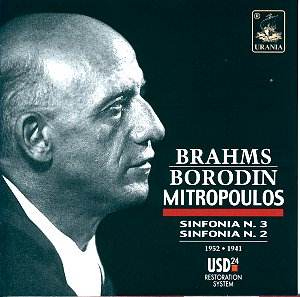The liner note avows that these monophonic recordings
have been restored using the "USD24" process, about which
nothing more is said. There is no hiss, crackle, or deep bass, and the
sound is clear and quite listenable (Track 4), even enjoyable, if tending
to stridency. The Brahms is from a tape recording (presumably a home
recording of a broadcast) which has stretched some, resulting in occasional
slight pitch instability and a few dropouts (which should have been
corrected, this being quite easy to do with any restoration software).
Being a live recording it contains coughs, and an unexplained banging
sound at one point (Track 2). The Borodin sounds almost too good to
be 1941, but Columbia was doing some good work then.
The musical performances are excellent, lovingly sculpted
with much attention to details of phrasing and frequent adjustments
of tempo, in the manner of Stokowski, but the masculine pulse of the
music remains very strong, and there is a less mystical and more sensual
personality in evidence. This is, in a phrase, the best performance
of the Borodin Iíve ever heard (track 8). The Brahms is at times excellent,
but perhaps the exigencies of a live performance meant that concentration
would occasionally be lost. The first movement is the least extraordinary,
the second movement the most successful, the last two extremely good.
It used to be that one valued the musical judgement
of a conductor in determining which of the repeats indicated in the
score should be observed and which not. These days if a conductor leaves
out a repeat it is considered a matter of consumer fraud. The conductor
can expect to be arrested by the Bureau of Weights and Measures and
hauled into court next to the butcher with his thumb on the scale and
the seller of short-filled cracker boxes. Leopold Stokowski, Fritz Reiner,
Dimitri Mitropoulos and I all feel that the first movement exposition
repeat in the Brahms Third Symphony should not be observed. You want
to disagree with that, letís see who youíve got in your corner!
Paul Shoemaker
